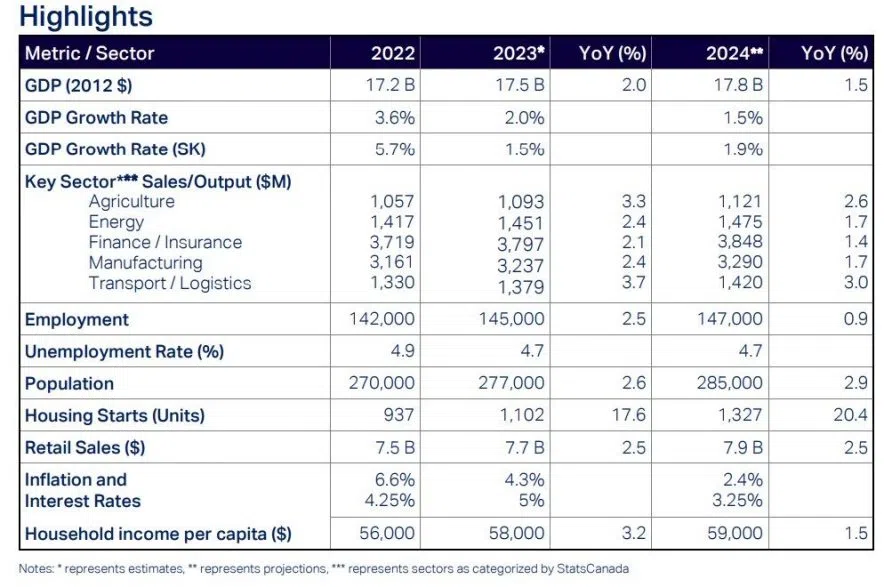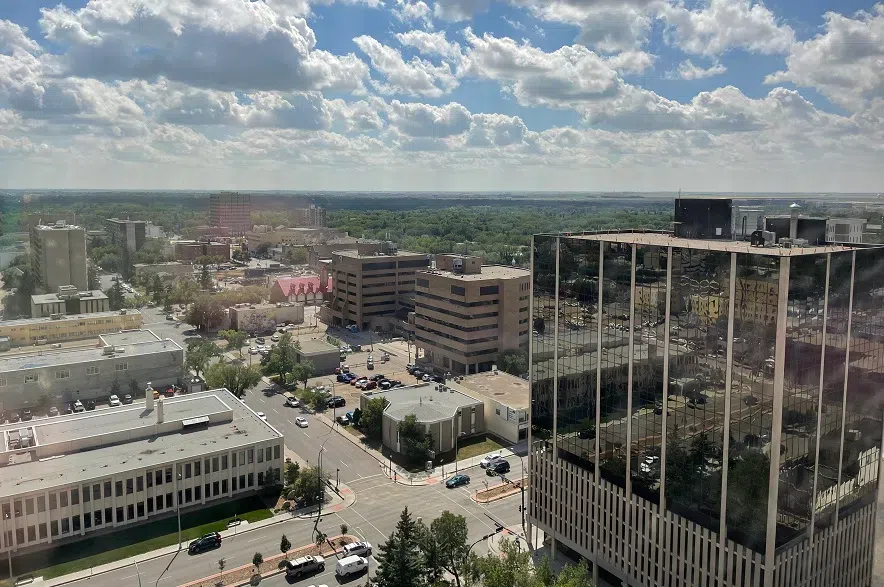The Queen City’s economy is sitting pretty.
That’s according to a report by Economic Development Regina, which gave the Greater Regina Area’s economy a ‘B+’ for 2024.
Economic Development Regina’s Chris Lane said that grade was derived from six important factors, including as GDP growth, employment, housing, key sectors of the economy, people, and new markets and emerging sectors.
“(We looked at) each one in depth, and looked at not only where we were in the last couple years but also where we think we’re going in 2024 and ‘25,” Lane said.
“Each one of those sectors has its own grade, and all compiled we figured that Regina is sort of at about a B+ level which, overall, is pretty good, and we’re and we’re excited about that.”
Lane said the B+ grade shows that Regina is one of the leaders in Canada when it comes to things like economic growth, which is reflected in the city’s projected GDP growth rate of 1.5 per cent for 2024.
Regina was given an A for GDP growth in the report.

Highlights from Economic Development Regina’s report on the city’s economy. (Economic Development Regina)
The city was also given an A- for the “key sectors” section, which includes things like agriculture and agribusiness, energy, renewables and advanced manufacturing.
Lane said transportation and logistics is also becoming an area of advantage for Regina.
“We have intermodal facilities like the (Global Transportation Hub) or the Chuka Creek Business Park, and it’s served with good infrastructure and both rail lines so those are the kind of sectors that play on each other, and they’re built to serve some of the most in-demand industries right now globally,” Lane said.
Lane also praised Regina’s potash industry and its agriculture and food production businesses, as well as its energy production.
“All of the key sectors that Regina is really sort of built around are in a moment of strength right now, and that really underpins Regina’s growth, and our forecast growth as one of those leaders in the country,” he said.
Though the report places Regina in a good spot, the grade does leave plenty of room for improvement.
Lane said a key area for improvement is talent attraction and retention – a key focus for both the city and Economic Development Regina itself.
“So what are we doing to make sure that when we position this city as a globally competitive city to attract talent and people with the skills we need? Are we making sure that they’re matching the kind of jobs and the kind of skills required to do those jobs as our economy grows?” Lane asked.
“The other thing is making sure that we understand and (know) how to influence the kind of city building that goes on, to make sure that this is a city that when people come here, they stay here.
“We know that like a lot of cities in Canada that we’re a good first stop for newcomers to Canada in Regina, but often they move on to other cities in the country and we just want to make sure that we have a chance to be competitive to maintain and retain those newcomers as they start a family or build a life.”
Lane said Economic Development Regina will lead a strategy that’s currently in the works to help people stay in Regina.
The report also identified Regina’s housing market as an area for improvement, giving it a C+ grade.
Lane said the Bank of Canada’s recent decision to cut its key interest rate is a step in the right direction, and one that could help alleviate concerns over the housing market.
“Because we know we have some housing challenges, a decrease in interest rate opens up the market, I think. It makes housing a little bit more affordable,” he said.
“More importantly than just what one interest rate drop signals, it signals that maybe the macroeconomic factors in the country – and therefore Saskatchewan – are changing, so that we can expect either levelling off or decrease in those interest rates over time.”
Lane said that could allow for more investment in local startups, in addition to easing pressure on the housing market.











